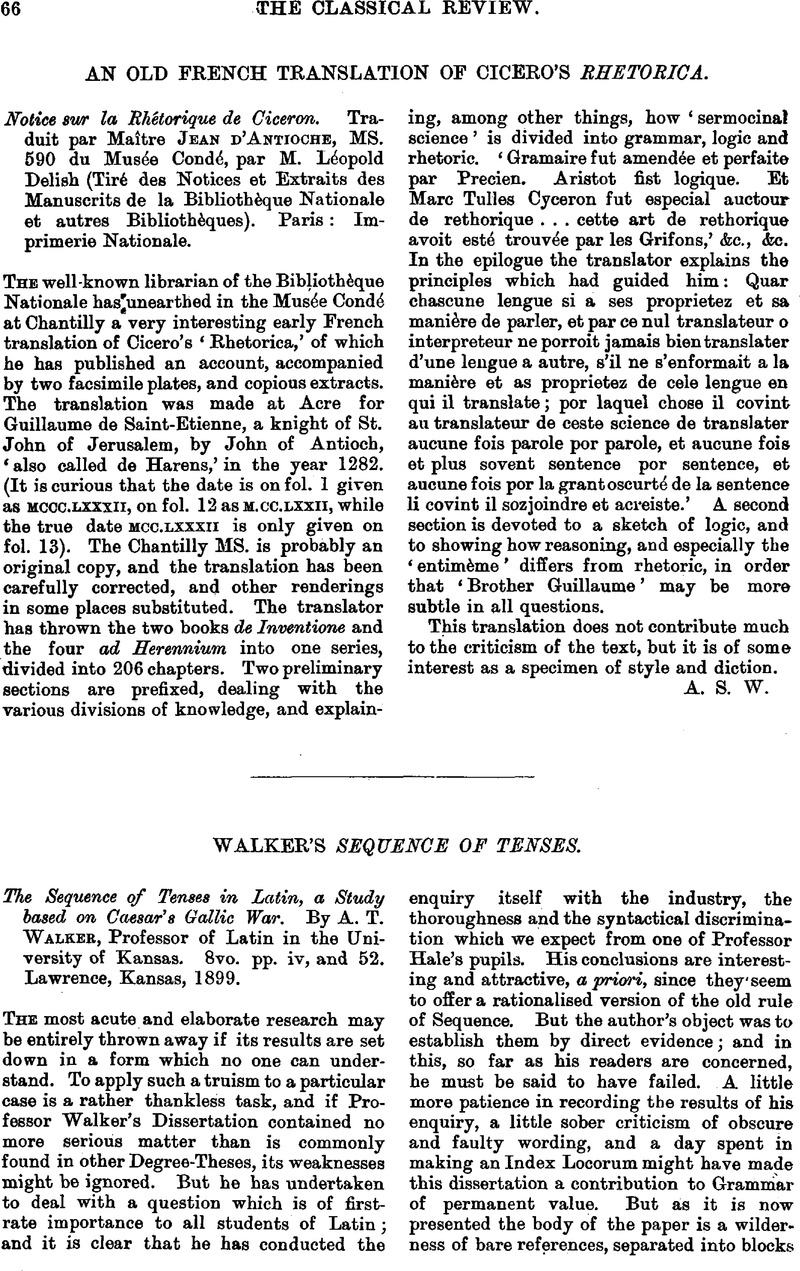No CrossRef data available.
Article contents
Walker's Sequence of Tenses - The Sequence of Tenses in Latin, a Study based on Caesar's Gallic War. By A. T. Walker, Professor of Latin in the University of Kansas. 8vo. pp. iv, and 52. Lawrence, Kansas, 1899.
Review products
Published online by Cambridge University Press: 27 October 2009
Abstract

- Type
- Reviews and Comptes Rendus
- Information
- Copyright
- Copyright © The Classical Association 1901
References
page 67 note 1 In some passages the author has stated (or printed) precisely what he does not mean. For instance on p. 40 we read as the title of a Class: ‘The present of a general truth following a past in indirect question.’ But if the reader verifies the reference he finds that it is not the Past that is in the Indirect Question, but the Present. A not seems to be omitted on p. 3, 1. 20, and p. 30, footnote.
page 67 note 2 Compared to this radical defect mere faults of style, such as the absence of capital letters (so that, e.g., ‘the present’ denotes both a Tense and a time), are venial enough. But the use of novel technical terms without any explanation is particularly tiresome. By looking up some of the references the reader may find the meaning of ‘clauses in congruence’ and ‘clauses in coincidence’ (p. 42); but I have completely failed to discover what kind of clauses are in ‘pseudo-coincidence’—a term which Prof. Walker finds room to condemn but not to explain. He merely gives an example the difference of which from those cited under ‘congruence’ I have not grasped.
page 67 note 3 The haphazard examples which follow are not taken from Prof. Walker, but I think they represent his meaning.
page 67 note 4 On pp. 21 and 24 the author makes special subdivisions of Descriptive and Aoristic Pluperfects, in which the action ‘both began and ended at the same time as the action of the Principal Verb’ (on which either depends). So far as I can see this is not a correct statement of the force of the Tense in the examples he quotes; and it is certainly in direct contradiction to the definition of the Pluperfect meanings (p. 6).
page 68 note 1 I cannot understand why the author ‘excepts’ two classes of clauses (on p. 8); on p. 7 he has shown that one of them is not in Sequence at all.
page 68 note 2 The original wording runs ‘is an exception,’ which does not seem to express what the author means. And in this extract and in those that follow below, anyone who dislikes capital letters must please blame the reviewer not the author.
page 68 note 3 The list of references for the Impf. is given on p. 31, for the Perf. on p. 40. Like the other lists, they need verifying and perhaps sifting, but on such a point as this they may no doubt be taken as approximately correct.
page 68 note 4 For instance in oro facias and orabam faceres the wish which the Subjunctive expresses is not completely intelligible without some indication, or assumption, (1) of the person who felt or feels it, and (2) of the time at which it is or was felt (as well as of the time to which it refers which the Subjunctive Verb itself expresses). The first of these, it is clear, is implied by the subordination to the Principal Verb, the second by the choice of a Tense which corresponds to that of the Principal Verb, i.e. by Sequence.
page 69 note 1 This of course is not the only effect of Sequence. A Primary governing Verb demands a Perfect in the Subjunctive of Indirect Questions, whether the original question had the Perfect or Imperfect or Plu-perfect. This ‘flattening out’ Prof. Walker denies altogether for Caesar. It is surprising to learn that there are no parallels in Caesar to the examples quoted from Cicero by, e.g., Allen and Greenough, § 387 b, 3.


